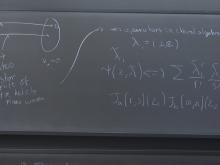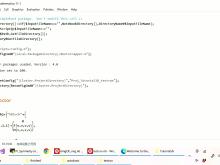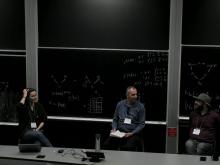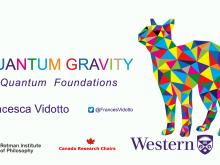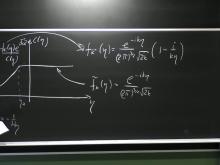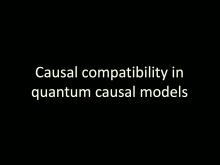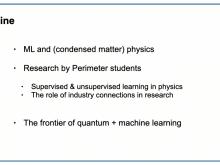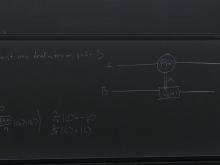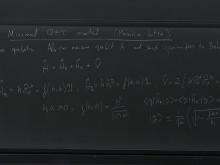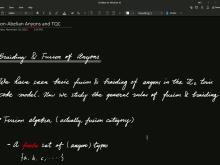Format results
-
13 talks-Collection NumberC23027
Talk
-

Mathematical Physics Lecture (230403)
Kevin Costello Perimeter Institute for Theoretical Physics
PIRSA:23040042 -

Mathematical Physics Lecture (230404)
Kevin Costello Perimeter Institute for Theoretical Physics
PIRSA:23040075 -

Mathematical Physics Lecture (230405)
Kevin Costello Perimeter Institute for Theoretical Physics
PIRSA:23040043 -

Mathematical Physics Lecture (230404)
Kevin Costello Perimeter Institute for Theoretical Physics
PIRSA:23040076 -

Mathematical Physics Lecture (230412)
Kevin Costello Perimeter Institute for Theoretical Physics
PIRSA:23040046 -

Mathematical Physics Lecture (230414)
Kevin Costello Perimeter Institute for Theoretical Physics
PIRSA:23040047 -

Mathematical Physics Lecture (230417)
Kevin Costello Perimeter Institute for Theoretical Physics
PIRSA:23040048 -

Mathematical Physics Lecture (230404)
Kevin Costello Perimeter Institute for Theoretical Physics
PIRSA:23040077
-
-
Mini-Course of Numerical Conformal Bootstrap
15 talks-Collection NumberC23030Talk
-

Lecture 1: Introduction and Overview; Bootstrapping Ising mixed correlator
-
Ning Su Università di Pisa
- Aike Liu
-
-

-

-

Lecture 2: Bootstrapping global symmetries. Cutting surface algorithm
Ning Su Università di Pisa
-

-

-

-

-
-
Causal Inference & Quantum Foundations Workshop
26 talks-Collection NumberC23017Talk
-

Welcome and Opening Remarks
Elie Wolfe Perimeter Institute for Theoretical Physics
-

Tutorial 1
Robert Spekkens Perimeter Institute for Theoretical Physics
-

Graphical models: fundamentals, origins, and beyond
Steffen Lauritzen University of Copenhagen
-

Towards standard imsets for maximal ancestral graphs
Robin Evans University of Oxford
-

-

Correlations from joint measurements in boxworld and applications to information processing
Mirjam Weilenmann Institute for Quantum Optics and Quantum Information (IQOQI) - Vienna
PIRSA:23040107 -

Observational Equivalences Between Causal Structures with Latent Variables
Marina Maciel Ansanelli Perimeter Institute for Theoretical Physics
-

-
-
Scicomm Collider
5 talks-Collection NumberC23014Talk
-

Dark Matter and Particle Physics
Luna Zagorac Perimeter Institute for Theoretical Physics
-

-

Cosmology
-
Matthew Johnson York University
-
Jessica Muir University of Cincinnati
-
-

-

-
-
Quantum Field Theory in Curved Spacetime
7 talks-Collection NumberC23031Talk
-

Quantum Field Theory in Curved Spacetime (AM) - 2023-03-03
Sergey Sibiryakov McMaster University
-

Quantum Field Theory in Curved Spacetime (PM) - 2023-03-03
Sergey Sibiryakov McMaster University
-

Quantum Field Theory in Curved Spacetime (PM) - 2023-03-10
Sergey Sibiryakov McMaster University
-

Quantum Field Theory in Curved Spacetime (PM) - 2023-03-17
Sergey Sibiryakov McMaster University
-

Quantum Field Theory in Curved Spacetime (PM) - 2023-03-24
Sergey Sibiryakov McMaster University
-

Quantum Field Theory in Curved Spacetime (PM) - 2023-03-31
Sergey Sibiryakov McMaster University
-

-
-
Causal Inference: Classical and Quantum
10 talks-Collection NumberC23016Talk
-

Causal Inference Lecture - 230306
Robert Spekkens Perimeter Institute for Theoretical Physics
PIRSA:23030069 -

Causal Inference Lecture - 230308
Robert Spekkens Perimeter Institute for Theoretical Physics
PIRSA:23030070 -

Causal Inference Lecture - 230313
Robert Spekkens Perimeter Institute for Theoretical Physics
PIRSA:23030071 -

Causal Inference Lecture - 230315
Robert Spekkens Perimeter Institute for Theoretical Physics
PIRSA:23030072 -

Causal Inference Lecture - 230320
Robert Spekkens Perimeter Institute for Theoretical Physics
PIRSA:23030073 -

Causal Inference Lecture - 230322
Robert Spekkens Perimeter Institute for Theoretical Physics
PIRSA:23030074 -

Causal Inference Lecture - 230329
Robert Spekkens Perimeter Institute for Theoretical Physics
PIRSA:23030076 -

Causal Inference Lecture - 230403
Robert Spekkens Perimeter Institute for Theoretical Physics
PIRSA:23040000
-
-
Particle Physics (2022/2023)
13 talks-Collection NumberC23013Talk
-

Particle Physics Lecture - 230301
Asimina Arvanitaki Perimeter Institute for Theoretical Physics
PIRSA:23030055 -

Particle Physics Lecture - 230303
Asimina Arvanitaki Perimeter Institute for Theoretical Physics
PIRSA:23030056 -

Particle Physics Lecture - 230306
Asimina Arvanitaki Perimeter Institute for Theoretical Physics
PIRSA:23030057 -

Particle Physics Lecture - 230308
Asimina Arvanitaki Perimeter Institute for Theoretical Physics
PIRSA:23030058 -

Particle Physics Lecture - 230310
Asimina Arvanitaki Perimeter Institute for Theoretical Physics
PIRSA:23030059 -

Particle Physics Lecture - 230313
Asimina Arvanitaki Perimeter Institute for Theoretical Physics
PIRSA:23030060 -

Particle Physics Lecture - 230315
PIRSA:23030061 -

Particle Physics Lecture - 230320
Junwu Huang Perimeter Institute for Theoretical Physics
PIRSA:23030063
-
-
Machine Learning for Many-Body Physics (2022/2023)
13 talks-Collection NumberC23011Talk
-

Machine Learning Lecture - 230228
Lauren Hayward Perimeter Institute for Theoretical Physics
PIRSA:23020018 -

Machine Learning Lecture - 230228 pt 2
Lauren Hayward Perimeter Institute for Theoretical Physics
PIRSA:23030033 -

Machine Learning Lecture - 230302
Lauren Hayward Perimeter Institute for Theoretical Physics
PIRSA:23030029 -

Machine Learning Lecture - 230306
Lauren Hayward Perimeter Institute for Theoretical Physics
PIRSA:23030038 -

Machine Learning Lecture - 230307
Lauren Hayward Perimeter Institute for Theoretical Physics
PIRSA:23030030 -

Machine Learning Lecture - 230309
Lauren Hayward Perimeter Institute for Theoretical Physics
PIRSA:23030031 -

Machine Learning Lecture - 230314
Lauren Hayward Perimeter Institute for Theoretical Physics
PIRSA:23030032 -

Machine Learning Lecture - 230320
Lauren Hayward Perimeter Institute for Theoretical Physics
PIRSA:23030040
-
-
Quantum Information (2022/2023)
13 talks-Collection NumberC23009Talk
-
Strong Gravity (2022/2023)
13 talks-Collection NumberC23012Talk
-

Strong Gravity Lecture - 230228
William East Perimeter Institute for Theoretical Physics
PIRSA:23020020 -

Strong Gravity Lecture - 230302
William East Perimeter Institute for Theoretical Physics
PIRSA:23030042 -

Strong Gravity Lecture - 230306
William East Perimeter Institute for Theoretical Physics
PIRSA:23030051 -

Strong Gravity Lecture - 230307
William East Perimeter Institute for Theoretical Physics
PIRSA:23030043 -

Strong Gravity Lecture - 230309
William East Perimeter Institute for Theoretical Physics
PIRSA:23030044 -

Strong Gravity Lecture - 230314
William East Perimeter Institute for Theoretical Physics
PIRSA:23030045 -

Strong Gravity Lecture - 230316
William East Perimeter Institute for Theoretical Physics
PIRSA:23030046 -

Strong Gravity Lecture - 230320
William East Perimeter Institute for Theoretical Physics
PIRSA:23030053
-
-
Quantum Fields and Strings (2022/2023)
13 talks-Collection NumberC23010Talk
-

Quantum Fields and Strings Lecture - 230301
Dan Wohns Perimeter Institute for Theoretical Physics
PIRSA:23030015 -

Quantum Fields and Strings Lecture - 230302
Dan Wohns Perimeter Institute for Theoretical Physics
PIRSA:23030016 -

Quantum Fields and Strings Lecture - 230306
Jaume Gomis Perimeter Institute for Theoretical Physics
PIRSA:23030017 -

Quantum Fields and Strings Lecture - 230308
Jaume Gomis Perimeter Institute for Theoretical Physics
PIRSA:23030018 -

Quantum Fields and Strings Lecture - 230310
Jaume Gomis Perimeter Institute for Theoretical Physics
PIRSA:23030019 -

Quantum Fields and Strings Lecture - 230313
Jaume Gomis Perimeter Institute for Theoretical Physics
PIRSA:23030020 -

Quantum Fields and Strings Lecture - 230315
Jaume Gomis Perimeter Institute for Theoretical Physics
PIRSA:23030021 -

Quantum Fields and Strings Lecture - 230320
Davide Gaiotto Perimeter Institute for Theoretical Physics
PIRSA:23030023
-
-
Mini introductory course on topological orders and topological quantum computing
2 talks-Collection NumberC23023Talk
-
Mathematical Physics - Elective (2022/2023)
13 talks-Collection NumberC23027Title: An introduction to twistors Course Description: Twistor theory, introduced by Penrose many years ago, is a way to reformulate massless fields on four-dimensional space-time in terms of an auxiliary 6-dimensional complex manifold, called twistor space. This course will introduce twistor space and the Penrose correspondence (relating fields on twistor space and space-time), at both classical and quantum levels. We will discuss the twistor realization of self-dual Yang-Mills theory and of self-dual gravity. If time permits we will discuss the connection between twistors and celestial holography.
-
Mini-Course of Numerical Conformal Bootstrap
15 talks-Collection NumberC23030This school will be an advanced course on the numerical bootstrap. In the lectures, we will discuss advanced theoretical aspects of numerical bootstrap and algorithms. In the tutorials, we will demonstrate how to use simpleboot/hyperion and help the participants to run bootstrap computation on their own clusters. Main examples are 3D Ising, O(2), O(3), Gross-Neveu-Yukawa CFTs.
The school will consist of one lecture in the morning and two tutorials in the afternoon (one tutorial for simpleboot (by Ning Su) and another one for hyperion (by Aike Liu).
Course materials, including tutorials, slides, and sample codes, can be found at https://gitlab.com/AikeLiu/Bootstrap-Mini-Course
This event is supported by the Simons Collaboration on The Nonperturbative Bootstrap (https://bootstrapcollaboration.com/).
Territorial Land Acknowledgement
Perimeter Institute acknowledges that it is situated on the traditional territory of the Anishinaabe, Haudenosaunee, and Neutral peoples.
Perimeter Institute is located on the Haldimand Tract. After the American Revolution, the tract was granted by the British to the Six Nations of the Grand River and the Mississaugas of the Credit First Nation as compensation for their role in the war and for the loss of their traditional lands in upstate New York. Of the 950,000 acres granted to the Haudenosaunee, less than 5 percent remains Six Nations land. Only 6,100 acres remain Mississaugas of the Credit land.
We thank the Anishinaabe, Haudenosaunee, and Neutral peoples for hosting us on their land.
-
Causal Inference & Quantum Foundations Workshop
26 talks-Collection NumberC23017Recently we have seen exciting results at the intersection of quantum foundations and the statistical analysis of causal hypotheses by virtue of the centrality of latent variable models to both fields.
In this workshop we will explore how academics from both sides can move the shared frontiers forward. Towards that end, we are including extensive breakout collaboration opportunities in addition to formal presentations. In order to make concrete progress on problems pertinent to both communities, we have selected the topic of causal models with restricted cardinality of the latent variables as a special focus for this workshop.
Sponsorship for this workshop has been provided by:
Territorial Land Acknowledgement
Perimeter Institute acknowledges that it is situated on the traditional territory of the Anishinaabe, Haudenosaunee, and Neutral peoples.
Perimeter Institute is located on the Haldimand Tract. After the American Revolution, the tract was granted by the British to the Six Nations of the Grand River and the Mississaugas of the Credit First Nation as compensation for their role in the war and for the loss of their traditional lands in upstate New York. Of the 950,000 acres granted to the Haudenosaunee, less than 5 percent remains Six Nations land. Only 6,100 acres remain Mississaugas of the Credit land.
We thank the Anishinaabe, Haudenosaunee, and Neutral peoples for hosting us on their land.
-
-
Quantum Field Theory in Curved Spacetime
7 talks-Collection NumberC23031The course is an introduction to quantum field theory in curved spacetime. Upon building up the general formalism, the latter is applied to several topics in the modern theory of gravity and cosmology where the quantum properties of fundamental fields play an essential role.
Topics to be covered:
1) Radiation of particles by moving mirrors
2) Hawking radiation of black holes
3) Production of primordial density perturbations and gravity waves during inflation
4) Statistical properties of the primordial spectra
Required prior knowledge:
Foundations of quantum mechanics and general relativity -
Causal Inference: Classical and Quantum
10 talks-Collection NumberC23016Can the effectiveness of a medical treatment be determined without the expense of a randomized controlled trial? Can the impact of a new policy be disentangled from other factors that happen to vary at the same time? Questions such as these are the purview of the field of causal inference, a general-purpose science of cause and effect, applicable in domains ranging from epidemiology to economics. Researchers in this field seek in particular to find techniques for extracting causal conclusions from statistical data. Meanwhile, one of the most significant results in the foundations of quantum theory—Bell’s theorem—can also be understood as an attempt to disentangle correlation and causation. Recently, it has been recognized that Bell’s result is an early foray into the field of causal inference and that the insights derived from almost 60 years of research on his theorem can supplement and improve upon state-of-the-art causal inference techniques. In the other direction, the conceptual framework developed by causal inference researchers provides a fruitful new perspective on what could possibly count as a satisfactory causal explanation of the quantum correlations observed in Bell experiments. Efforts to elaborate upon these connections have led to an exciting flow of techniques and insights across the disciplinary divide. This course will explore what is happening at the intersection of these two fields. zoom link: https://pitp.zoom.us/j/94143784665?pwd=VFJpajVIMEtvYmRabFYzYnNRSVAvZz09
-
Particle Physics (2022/2023)
13 talks-Collection NumberC23013This course will cover phenomenological studies and experimental searches for new physics beyond the Standard Model, including: natruralness, extra dimension, supersymmetry, dark matter (WIMPs and Axions), grand unification, flavour and baryogenesis. -
Machine Learning for Many-Body Physics (2022/2023)
13 talks-Collection NumberC23011This course is designed to introduce machine learning techniques for studying classical and quantum many-body problems encountered in quantum matter, quantum information, and related fields of physics. Lectures will emphasize relationships between statistical physics and machine learning. Tutorials and homework assignments will focus on developing programming skills for machine learning using Python.
-
Quantum Information (2022/2023)
13 talks-Collection NumberC23009We will review the notion of information in the most possible general sense. Then we will revisit our definitions of entropy in quantum physics from an informational point of view and how it relates to information theory and thermodynamics. We will discuss entanglement in quantum mechanics from the point of view of information theory, and how to quantify it and distinguish it from classical correlations. We will derive Bell inequalities and discuss their importance, and how quantum information protocols can use entanglement as a resource. We will introduce other notions of quantum correlations besides entanglement and what distinguishes them from classical correlations. We will also analyze measurement theory in quantum mechanics, the notion of generalized measurements and their importance in the processing and transmission of information. We will introduce the notions of quantum circuits and see some of the most famous algorithms in quantum information processing, as well as in quantum cryptography. We will end with a little introduction to the notions of relativistic quantum information and a discussion about quantum ethics.
-
Strong Gravity (2022/2023)
13 talks-Collection NumberC23012This course will introduce some advanced topics in general relativity related to describing gravity in the strong field and dynamical regime. Topics covered include properties of spinning black holes, black hole thermodynamics and energy extraction, how to define horizons in a dynamical setting, formulations of the Einstein equations as constraint and evolution equations, and gravitational waves and how they are sourced. -
Quantum Fields and Strings (2022/2023)
13 talks-Collection NumberC23010This survey course introduces three advanced topics in quantum fields and strings: anomalies, conformal field theory, and string theory. -
Mini introductory course on topological orders and topological quantum computing
2 talks-Collection NumberC23023In this mini course, I shall introduce the basic concepts in 2D topological orders by studying simple models of topological orders and then introduce topological quantum computing based on Fibonacci anyons. Here is the (not perfectly ordered) syllabus.
- Overview of topological phases of matter
- Z2 toric code model: the simplest model of 2D topological orders
- Quick generalization to the quantum double model
- Anyons, topological entanglement entropy, S and T matrices
- Fusion and braiding of anyons: quantum dimensions, pentagon and hexagon identities
- Fibonacci anyons
- Topological quantum computing
